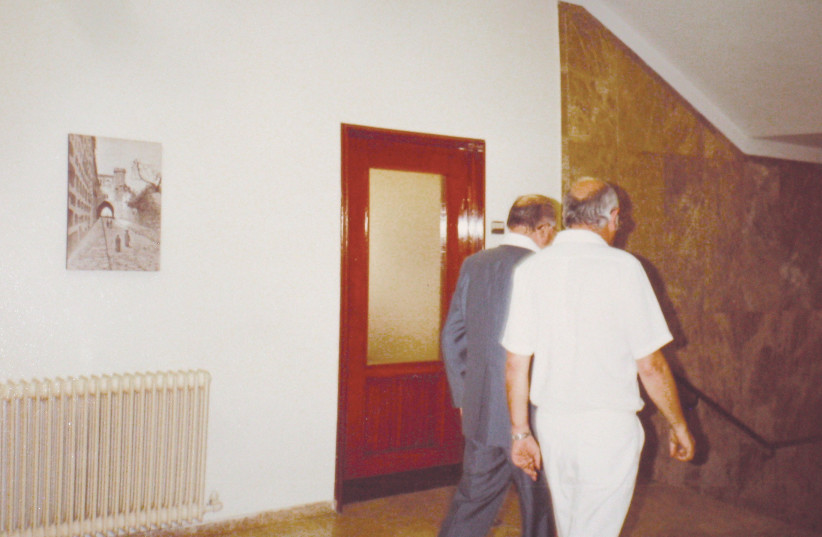“Whatever you do, don’t ask Prime Minister Begin any questions about what Israel is doing in Lebanon right now.”
Yechiel Kadishai
“Whatever you do, don’t ask Prime Minister Begin any questions about what Israel is doing in Lebanon right now.”
That stern warning was issued 40 years ago by Yechiel Kadishai, Menachem Begin’s longtime close confidant, personal secretary, and chief of staff. It came moments before I suddenly was face to face with Begin in what remains the most frustrating five minutes of my more than half-century journalistic career.
Meeting Israeli prime minister Menachem Begin in 1978
The story begins in 1978, when Begin and his wife, Aliza, were guests of New York City Mayor Ed Koch for four days at Gracie Mansion, the mayor’s residence.
My lifelong friend Rozanne Gold, now an international restaurant consultant and author, was Koch’s executive chef at the time, and she befriended the Begins. Rozanne later connected me with Kadishai, which opened the door to a highly dramatic moment during one of my subsequent trips to Israel.

Kadishai liked that I spoke Hebrew, had studied at Hebrew University, and frequently visited Israel. In 1979, he invited me to a private ceremony and introduced me to Begin, who signed his “White Nights” book for me. We exchanged pleasantries, and I was thrilled.
Meeting Israeli prime minister Menachem Begin in 1982
There were no pleasantries, however, during my 1982 visit. Although he’d earlier made peace with Egypt, Begin had just led Israel into the still-controversial First Lebanon War, as it became known: an effort to destroy the Palestinian Liberation Organization’s infrastructure in that country.
I called Kadishai upon my arrival in Tel Aviv. “Come to our office tomorrow”, he said. “As you know, we’re a little busy right now, but stop by and we’ll have a cup of tea.” There was no mention of Begin, and given that he had not been seen in public for some days, I wasn’t even sure where the prime minister was.
The next day in Jerusalem, sitting across from Kadishai – the ultimate gatekeeper for access to his boss – I watched and listened as he expertly juggled phone calls and drop-ins from staff members, switching from Hebrew to English to Yiddish to placate, pester, or plan, depending on to whom he was conversing.
During a lull in the frenzied activity, he dropped the bombshell: “The prime minister is in his office. I think he may come in here soon. If he does, you are not to remove your tape recorder from your bag or to ask him any questions about Lebanon and the siege of Beirut. He is not talking to anyone from the media or doing any interviews at all right now.”
Before I could respond, there he was. I was being re-introduced to Begin before I even had time to rise from my seat. Oddly, my clearest visual impression of that moment is of the prime minister’s large, gleaming, bald head, just inches from my face – a Jewish version of the Wizard of Oz, minus the fire and brimstone.
The next few minutes were bizarre and almost unbearable. I was a correspondent and newscaster for NBC Radio’s young adult network at the time, and every reporter in the world would have killed for a moment with Menachem.
But I dared not cross Kadishai, who despite his outward demeanor as a jovial zayde (“grandpa”), could still intimidate others as he must have during his years in Begin’s Irgun underground.
So I held my tongue, other than saying a quick hello, and stood there feeling helpless, foolish, and a bit like a traitor to my profession as Begin and Kadishai went over some scheduling matters. He left the room as abruptly as he had entered, and as he quickly strode away with an aide, I asked Kadishai, “Wait, can I at least take a picture of him?” “Of course”, was the reply, “but he has no time to stop and pose.”
I poked my camera out the office door and got a clear photo of the back of that shiny head as it disappeared down the hall.
A brief but rare meeting with Begin
The following afternoon, at the NBC bureau in Herzliya, I met veteran TV anchor John Chancellor, recently returned from Beirut. Sitting nearby as he and his producers discussed their unsuccessful and increasingly desperate efforts to somehow score an interview with the prime minister, I mentioned that I had spent a few minutes with him in his office the previous day.
Chancellor turned red and sputtered, “What do you mean? How did that happen? Who did you say you are again?” I was actually enjoying the self-important newsman’s indignation and decided to be vague about the exact nature of my visit.
I had to laugh when I later learned that he personally phoned NBC headquarters in New York, demanding to know how a radio reporter in his 20s could possibly have gotten into the prime minister’s office, while someone of Chancellor’s exalted stature couldn’t even get a callback.
How does one explain the concept of protekzia (connections), the Israeli system of “pull” without which nothing gets done? I was disappointed at the time that it didn’t get me an interview with Begin. Now, four decades later, I realize it afforded me a unique and unforgettable encounter at a key moment in the history of Israel. ■
